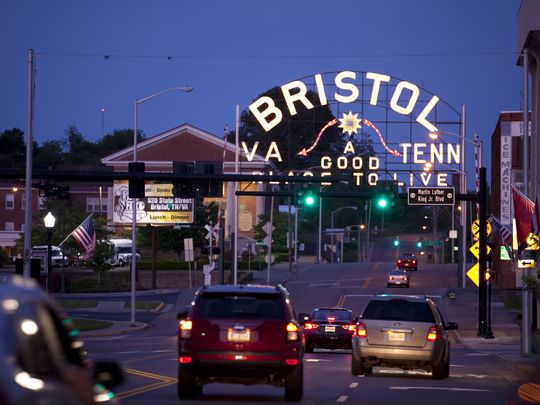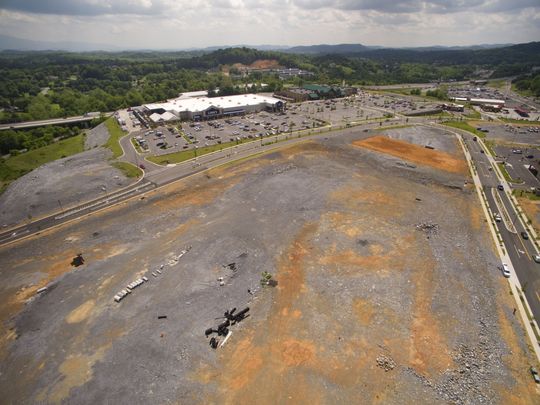Two Bristols Share Resources, But Face Very Different Rates

July 3, 2018 - On a warm night when State Street is lit like an Appalachian Broadway and music blares from restaurants and rooftop partiers yell "Honk your horn!" to passing cars, Bristol doesn't seem like a city in trouble.
But there are two sides to this old railroad hub about six hours southwest of Washington, D.C. - one in Tennessee and one in Virginia. Facing each other across the yellow line down State Street, the Tennessee city is healthy; its mirror image in Virginia is in near-crisis.
Too many years of bad decisions have left Bristol, Virginia, strangled with debt. The jail is desperately overcrowded, and only a last-minute boost in state funding saved the schools from deep cuts. City staff positions are being eliminated, although so far nothing has been shut down. Interest payments will soon climb to nearly a quarter of the city's general fund.
"We're about as low as you can go and not have cuts to services," City Manager Randall Eads said. "We are truly rebuilding this city from the foundation up."
Virginia is a famously well-run state, one of only about a dozen with a AAA bond rating (including Tennessee). Yet a number of Virginia's cities are in deep fiscal and economic trouble. Two years ago, Petersburg - south of Richmond - nearly went bankrupt. Hopewell, also near Richmond, is so dysfunctional that state officials can't even review its finances. The Southside city of Martinsville is considering reverting to town status, absorbing itself into the surrounding county.
The problems highlight disparity in a state that presents itself as a top-tier, economically advanced place to do business. Small cities and rural areas are losing population and economic power while the state's wealthy suburban crescent - from Washington, D.C., through Richmond to Hampton Roads - grows and prospers. As the gap widens, several quirks of Virginia state law make it harder for those suffering areas to help themselves.
"The state takes great pride in fiscal soundness and when localities start to falter, that reflects poorly on the state," said Martha Mavredes, Virginia's auditor of public accounts.
Alarmed by the near-collapse of Petersburg in 2016, the Virginia General Assembly tasked Mavredes with developing an early-warning system to flag municipal problems before they get too bad. The first report came out in March and - aside from Petersburg - Bristol was atop the list of concerns.

As night falls, traffic makes it way east on State Street in downtown Bristol. On the left side of the road is Virginia and Tennessee is on the right.
Photo by Timothy C. Wright, for The Washington Post
Being worst was a bit of a shock to Eads, a novice city manager who plunged into these problems just a year ago. But he knew things were bad.
"One of the biggest things we have to overcome as a city is our demographics," he said. Nearly a quarter of Bristol's residents are in poverty. More than 42 percent get some form of monthly government assistance. Because 83 percent of the city's school population qualifies for help, every pupil gets free lunch.
So Eads is resorting to some unconventional plans to try and turn things around.
To an outsider, the two Bristols look like one city. Drive around town and Google Maps will suddenly say, "Welcome to Tennessee," and a few turns later, "Welcome to Virginia." Small brass plaques embedded down the center line of State Street say "Tennessee" on one side and "Virginia" on the other.
At the far southwestern end of Interstate 81's path down the Great Appalachian Valley, Bristol is closer to the capitals of six other states than it is to Richmond (West Virginia, Tennessee, Kentucky, North Carolina, South Carolina and Georgia). It's known as the birthplace of country music for the Carter Family and other artists who came out of the mountains to make historic recordings there in the 1920s.
Both Bristols may be small - population about 17,000 in Virginia, about 27,000 in Tennessee - but the local NASCAR speedway seats nearly twice as many people as FedEx Field.
The two cities share a library and an emergency dispatch system. Their water systems are connected. They take turns paying the light bills on the giant "A nice place to live" sign over State Street and collaborate on festivals all year long, culminating in the Rhythm and Roots concerts every fall.
The two city halls are just blocks apart. But while they look out at the same town, they're facing different realities.
Virginia Bristol in Dire Straits
It started with a giant hole in the ground. The old city landfill in Bristol, Virginia, filled up about 20 years ago, and city leaders decided to build a new one in an abandoned rock quarry. It made sense - the quarry was a 20-acre pit, why not just fill it with trash?
But the limestone walls of the pit were porous. To prevent dangerous chemicals from seeping out, the city had to buy a new lining for the landfill walls roughly every two years, at a cost of $1.2 million each time.
Fees didn't cover the cost of operating the landfill, let alone replacing the liners. Today, the city carries more than $30 million in debt from the landfill and had to write off $22 million siphoned from the general fund to cover expenses.
As those costs spiraled upward, the city's tax base eroded. The whole region has been hit by the collapse of the coal industry. Alpha Natural Resources, one of the nation's largest coal companies, had built a glittering headquarters in Bristol in 2006. But it declared bankruptcy in 2015 and vacated the building the following year.
Around the same time, Ball Corp. moved a metal lid-making plant to Mexico. A commercial area developed just off I-81 in the 1990s began to sour. Tenants drained away from Bristol Mall until none was left. It finally closed last year.
Bristol needed a break.
So just as city leaders had tapped an old quarry to stay in the garbage business, they tapped another old quarry and decided to go into the commercial real estate business. Christened The Falls, the city-owned development was going to be a $260 million hub of restaurants and shops just off the highway.
But there was a potential problem: Less than 10 miles farther down I-81, an even bigger commercial development was underway. Across the line in Tennessee.
Steve Johnson runs his commercial real estate empire from the top floor of what appears to be an abandoned bank building on the Virginia side of State Street. There are no signs, nothing to indicate the building is occupied.
A star tight end at Virginia Tech in the 1980s, Johnson was drafted by the New England Patriots and later signed by the Dallas Cowboys before a knee injury cut short his career in 1990. At 53, he still seems near his playing size of 6-feet-6, 245 pounds.
In his sixth-floor office lined with football and NASCAR memorabilia, Johnson radiates the kind of success Bristol needs - sun-tanned in a golf shirt, writing big checks to his alma mater up in Blacksburg, donating thousands to (mostly Republican) state politicians. He owns homes on both sides of the state line.
A few years ago, the two Bristols came calling.
The Tennessee General Assembly passed a law aimed at helping its border cities compete with rivals in other states. Tennessee has no personal income tax, but it has sales tax of up to 9.75 percent - nearly twice Virginia's maximum 5.3 percent.
The difference tends to make people near the borders want to live in Tennessee and shop in Virginia. The new law allowed developers who built retail within 15 miles of a border to recoup some of the sales tax, making projects more attractive.
Johnson, who had his eye on a 200-acre piece of property along the highway, pounced. His development was called The Pinnacle, and it was unlike anything else in the region: A million square feet of shops and restaurants, anchored by a Bass Pro Shop, CarMax, Marshalls and a Belk department store. The project would be worth nearly $250 million.

The Falls development in Bristol, Va., which was to be a $260 million hub of restaurants and shops, has fewer than 10 merchants.
Photo by Timothy C. Wright, for The Washington Post
In Bristol, Virginia, the reaction was near-panic. Local officials asked Johnson to consider developing The Falls instead. They rushed legislation through the Virginia General Assembly to create sales tax revenue rebates for project developers.
Johnson says he spent a month studying the site for The Falls and came to a conclusion. "It was undevelopable," he said. The quarry site would be expensive to level and grade, the roads were too small, the spot was just wrong.
But the city found another developer and did it anyway.
Today, The Pinnacle boasts about 70 merchants. The Falls, so far, has fewer than 10. Rather than help the city deal with its landfill debt burden, The Falls has made the problem far worse. It added nearly $48 million to the city's tab, essentially maxing out its debt capacity.
Local voters were so unhappy with the city's decisions that they unseated the whole five-member panel. In 2016, the two top vote-getters were write-ins.
That new council began clearing out city staff. In January 2017, they looked to hire a new city attorney.
Randall Eads, 40, grew up in nearby Abingdon and graduated from Virginia Military Institute. For a decade, he was a criminal defense lawyer in partnership with his father. But as the area succumbed to a worsening plague of methamphetamines and prescription drug abuse, Eads began to lose heart for the job.
"In 2016, I had roughly four clients die of an overdose and one commit suicide," Eads said. Later that year, he got a client released on bond, despite having reservations about the man's fitness to be out of jail. "On the Sunday after Thanksgiving . . . he allegedly shot and killed his soon-to-be ex-wife," he said. "And that weighed heavily on me."
So when Bristol had an opening for city attorney, Eads took a leap and applied despite having no background in municipal law. He was hired, and within six months, the council fired the city manager and asked Eads to take her place.
Mounds of giant binders explaining municipal law line the table behind his desk. Eads knew the city had problems, but it was worse than he thought.
One of the most urgent issues is the city jail, built to house 67 inmates. In March, the city had 240 prisoners, thanks to the same drug crisis that drove Eads out of his law practice. About 140 of those have been squeezed into the jail; the rest are sent to a regional holding facility at a cost of $38 per inmate per day.
That adds up. So Eads has been working with local law enforcement, prosecutors and judges to come up with what seems like the only solution: a way to reduce inmate population.
His plan would create an alternative punishment program for nonviolent offenders, helping them find work and subjecting them to regular drug testing. It requires buy-in from the courts, law enforcement and local employers. Eads is working to keep them all together.
At the same time, Eads has been replacing city department heads and working to build morale, paying for staff picnics out of his pocket.
But the problems facing the city are daunting. Without changes it will soon face a $2.4 million annual shortfall in debt service payments.
It's a short walk from Eads' building, past the war memorial and the country music museum, across State Street and around a corner to another Bristol City Hall.
This one is in Tennessee, and the city manager here - Bill Sorah - has the job Eads might dream about. Sorah is from Tennessee but worked at the other Bristol earlier in his career. He knows the differences.
One major contrast is the constitutional status of each city. Virginia is the only state in the country in which cities are independent entities, not connected to a surrounding county. That quirk has origins in colonial times, when the British wanted to encourage trading centers between the vast plantations. Of the 41 independent cities in the country, 38 are in Virginia.
Bristol, Tennessee, is a unit of the surrounding Sullivan County. The city has no problem with inmate overcrowding because it has no jail. It also has no costly criminal courts or school system. The county takes care of all that.
The county also has land. If the city needed acreage to woo a new industry, for instance, it could follow a process to annex property from the county. The city ran utilities through some land near the highway in the early 2000s, for example, then annexed it and watched commercial development fill in, Sorah said. It also annexed a business and industrial park.
Virginia's Bristol has no such option. The state has had a moratorium on annexation since the early 1980s. It was supposed to be temporary, so lawmakers could study the issue, and was set to expire this year. But the General Assembly recently extended the moratorium to 2024.
Even if there were no ban, the fact that cities such as Bristol are independent entities means they are competing with surrounding counties. There's no incentive for a county to cede land to a city if it means losing tax revenue.
Over time, the Tennessee Bristol has accumulated other advantages. The NASCAR speedway and major regional hospital are both there. When Alpha Natural Resources went bankrupt, its restructured company - now known as Contura - moved over to Bristol, Tenn.
While Alpha's departure helped kill off Bristol, Virginia's, highway commercial zone, its relocation spruced up some old buildings on the Tennessee side. "Now you have a market for your lunch, your evenings, your restaurants, your specialty shops," Sorah said.
The biggest employer for the area, by far, is the collective retail and restaurant engine of The Pinnacle, that development built by Johnson. More than 2,000 full- and part-time workers, more than 6 million visitors last year, about $150 million in sales.
Johnson plans a second phase of that development on an adjacent piece of property in Virginia. But that's in Washington County, not the city of Bristol.
Earlier this year, Virginia's auditor granted Bristol $100,000 to hire a consultant to help figure out some fiscal solutions.
Eads, the city manager, has no experience, few resources and a novice city council. But that combination means he's willing to try almost anything to fix the city's problems. "We're in it," Eads likes to say, "so now we've got to fix it."
They've hiked fees at the landfill - not enough to cover costs, but it's a start. They're pushing ahead with The Falls, because the city has sunk too much into it to turn back now. Eads and Mayor Kevin Mumpower have developed a fiscal plan aimed at paying down debt and building cash reserves. They'll keep paring city departments, work up quarterly financial reviews and consider selling some city assets.
Mathematically, it could work - if Eads can score a few wins.
"If revenues don't [either] stay the same or increase, then we would have some truly fiscally distressing situations here," he said.
Recently, he got an unusual nibble. A group of local investors formed to purchase the shuttered Bristol Mall. They propose leasing it to another local start-up called Dharma Pharmaceuticals, which wants to convert the vast facility into an operation producing cannabidiol, the marijuana derivative that Virginia recently approved for treating certain illnesses.
The old J.C. Penney and Belk shells could one day be vast indoor growing fields for pot.
Pushed to the brink, local leaders and community members have embraced the proposal.
"The work ethic of the people of Appalachia is second to none," Eads said. "I'm going to give it everything I've got. And I may die trying, but so be it."
CoalZoom.com - Your Foremost Source for Coal News

